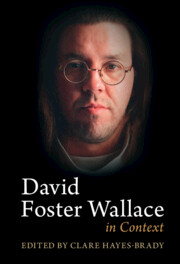Book contents
- David Foster Wallace in Context
- David Foster Wallace in Context
- Copyright page
- Contents
- Figures
- Contributors
- Acknowledgments
- Abbreviations
- Introduction
- Part I Contexts
- Chapter 1 David Foster Wallace and Narratology
- Chapter 2 A Meeting of Minds
- Chapter 3 Writing in a Material World
- Chapter 4 Confidence Man
- Chapter 5 David Foster Wallace and European Literature
- Chapter 6 David Foster Wallace and Poetry
- Chapter 7 David Foster Wallace’s “Non”-Fiction
- Chapter 8 “Thanks Everybody and I Hope You Like It”
- Chapter 9 David Foster Wallace and Visual Culture
- Part II Ideas
- Part III Bodies
- Part IV Systems
- Works by David Foster Wallace
- Bibliography of Secondary Sources
- Index
Chapter 3 - Writing in a Material World
David Foster Wallace and 1980s Fiction
from Part I - Contexts
Published online by Cambridge University Press: 18 November 2022
- David Foster Wallace in Context
- David Foster Wallace in Context
- Copyright page
- Contents
- Figures
- Contributors
- Acknowledgments
- Abbreviations
- Introduction
- Part I Contexts
- Chapter 1 David Foster Wallace and Narratology
- Chapter 2 A Meeting of Minds
- Chapter 3 Writing in a Material World
- Chapter 4 Confidence Man
- Chapter 5 David Foster Wallace and European Literature
- Chapter 6 David Foster Wallace and Poetry
- Chapter 7 David Foster Wallace’s “Non”-Fiction
- Chapter 8 “Thanks Everybody and I Hope You Like It”
- Chapter 9 David Foster Wallace and Visual Culture
- Part II Ideas
- Part III Bodies
- Part IV Systems
- Works by David Foster Wallace
- Bibliography of Secondary Sources
- Index
Summary
Wallace’s ambivalent engagement with high postmodernism is by now axiomatic in criticism, but his relationship to more immediate literary influences is less well understood. This chapter traces Wallace’s network of twentieth-century intertextuality beyond the familiar territory of his troublesome inheritances of Barth, Pynchon and Updike, focusing particularly on his entanglement in the written cultures of the 1980s. Much of the critical work that situates Wallace as a postmodernist heir focuses on the formal innovation and experimentation in his writing; this chapter broadens out to consider geography, motif and theme as well as form and idiom. More particularly, the chapter places Wallace in the context of the “Brat Pack,” arguing that his writing, animated by a spirit of what Jill Eisenstadt called “excess and defiance,” owes as much to the literary group that came of age during the 1980s as to the postmodernist patriarchs more commonly discussed. Taking as a point of departure the early writing, especially The Broom of the System and Girl with Curious Hair, in which many of these formative influences are more clearly visible than in the more mature work, this chapter considers the ways in which Wallace interacted with his own milieu and immediate forebears. Following the recent work of Thompson and Boswell in particular, the chapter also refers to Wallace’s own writing about his predecessors and peers, in which he often reflects, and indirectly reflects upon, the primary tendencies and themes of his own output; indeed, this chapter argues that the essays on other writers of the twentieth century are as revealing in respect of Wallace’s own writing as any of the overtly self-reflective/directive pieces. This chapter operates in conversation with the other chapters in this section, arguing that any attempt to interpret Wallace’s writing must be informed by an understanding of his complex critical, cultural and intertextual networks.
Keywords
- Type
- Chapter
- Information
- David Foster Wallace in Context , pp. 36 - 45Publisher: Cambridge University PressPrint publication year: 2022



